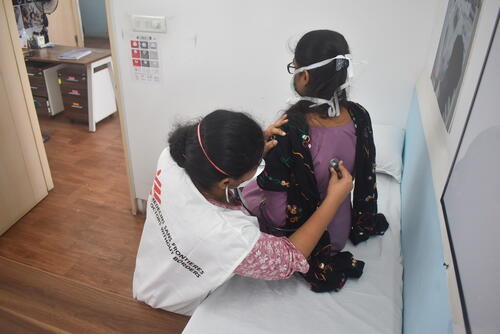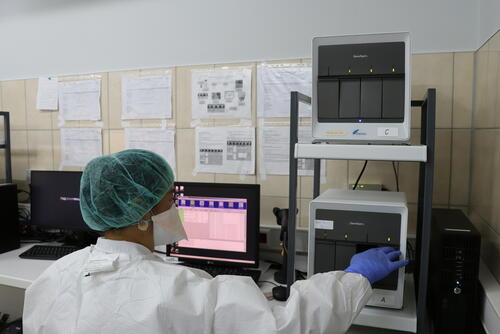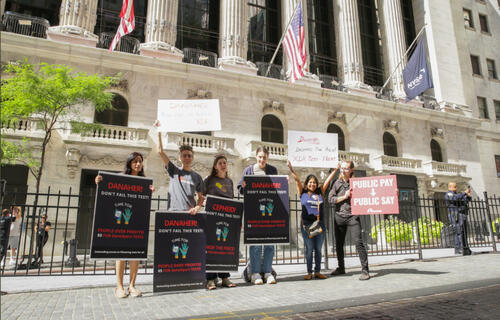Consolidated efforts over the past decade have led to major breakthroughs in tackling tuberculosis (TB), including shorter, more effective treatment options, and substantial reductions in drug and test prices.
Although curable, TB remains a leading cause of death globally: an estimated 10.6 million people contract the disease and more than 1.3 million die from it every year.WHO Global Tuberculosis Report 2023. While TB has been around for millennia, the available options for prevention, testing and treatment, particularly for resistant forms, were limited until around 2010, when significant advances started to be made, culminating in the notable achievements recorded in 2023.
Landmark clinical trials revolutionise treatment for multidrug-resistant TB (MDR-TB)
When scientific breakthroughs, including three new drugs (bedaquiline, delamanid and pretomanid) and a rapid molecular diagnostic test called GeneXpert, started to emerge from 2010 onwards, Médecins Sans Frontières (MSF) was among the first to implement their rollout. At this time, people with multidrug-resistant TB (MDR-TB) endured an agonising two years of treatment: 20 pills per day for two years, in addition to daily painful injections for up to eight months.
Treatment often resulted in severe side effects, including psychosis and hearing loss, yet achieved cure rates of only around 55 per cent. Having borne witness to this long and devasting journey for people with MDR-TB, MSF and partners initiated three innovative clinical trials, TB-PRACTECAL, endTB and endTB-Q, which aim to deliver better, safer and shorter treatment regimens. These trials were an attempt to fill the gap left by the pharmaceutical corporations, which brought new drugs to the market but did not go the last mile to find the best combination to cure people with MDR-TB.
In 2023, the impact of years of dedicated efforts finally became apparent, bringing tangible benefits both for people with TB and for national TB programmes. The first milestone was the rollout of the BPaLM regimen.BPaLM regimen – a combination of bedaquiline (B), pretomanid (Pa), linezolid (L) and moxifloxacin (M). This six-month, all-oral regimen studied in the TB-PRACTECAL trial combines bedaquiline and pretomanid with older drugs linezolid and moxifloxacin, achieving an impressive cure rate of 89 per cent. Recognising its advantages – highly effective, shorter, injection-free, less toxic, with options for everyone – the World Health Organization (WHO) now recommends BPaLM as the preferred first-line treatment for MDR-TB in people over 14 years of age.

The year also saw trailblazing results from MSF’s endTB trial: three additional, all-oral, nine-month treatment regimens, containing bedaquiline and/or delamanid, that showed high efficacy and safety in people with MDR-TB. The endTB regimens offer new treatment options, including for people for whom pretomanid is not recommended, such as children and pregnant women. A fourth endTB regimen also showed good results, and could be used as an alternative to longer regimens for people who cannot receive bedaquiline and/or linezolid due to drug resistance or intolerance.
In early 2023, the endTB-Q trial – which is evaluating treatment regimens for even more severe forms of TB, known as pre-extensively drug-resistant TB – finished enrolling patients, and the results are expected in early 2025.
These trials have made shorter, safer, and more effective treatments for MDR-TB a reality, already leading to huge improvements in treatment tolerance for people affected by MDR-TB. In addition, these new regimens are easing the challenges of TB programmes and clinicians in providing these treatments.
Major achievements in overcoming barriers to diagnosis and treatment
Unfortunately, access to these shorter and safer treatment regimens is not guaranteed for everyone. Among many barriers is cost: the newer drugs used in these regimens are very expensive, largely due to patent protections by pharmaceutical corporations. However, after more than a decade of advocacy and sustained public pressure by MSF’s Access Campaign and TB activists around the world, significant progress was made in 2023.
In August 2023, in a historic move, the US pharmaceutical corporation Johnson & Johnson (J&J) slashed the price of bedaquiline by 50 per cent, to US$130 for six months,StopTB, https://www.stoptb.org/news/stop-tbs-global-drug-facility-announces-historic-price-reductions-to-55-bedaquiline-life-saving the amount needed for one full treatment (BPaLM). This occurred after two TB survivors, Nandita Venkatesan and Phumeza Tisile, successfully blocked J&J’s attempt to extend its patent monopoly on bedaquiline in India in March. J&J subsequently announced the withdrawal of its secondary patents from all high-TB-burden countries, allowing the production of affordable generic versions. This price reduction will lead to savings of $26 million at the Global Fund over the coming three years,Presented by Brenda Waning, Chief, Global Drug Facility at ‘TB situation room’ webinar organised by Stop TB Partnership, The Global Fund, WHO, USAID, and BMGF, 13 October 2023. allowing countries to purchase an additional 450,000 six-month courses of bedaquiline.

Another win was an unprecedented victory regarding TB diagnostics in 2023. The public pressure of the ‘Time for $5’ campaign, started by the Access Campaign in 2019 and involving over 150 civil society organisations, paid off in September, when the US diagnostic corporation Cepheid, and its parent company Danaher, announced a 20 per cent reduction in the price of the GeneXpert TB test, from $9.98 to $7.97 per unit. This will result in estimated savings of $32 million per year at the Global Fund, representing an additional 3.6 million tests annually that can be purchased by countries, directly benefiting people with TB through timely and accurate diagnosis. MSF expects savings of $150,000 annually, freeing up resources for other programme needs, such as treatment and psychosocial support.
Children also benefit
This year also saw an increase in children diagnosed with TB in pilot sites implementing new WHO recommendations, and the launch of a multisite operational research and multicountry policy survey. These initiatives form part of the multicountry intersectional project, TACTiC (Test, Avoid, Cure TB in Children), approved in 2023.
People with TB and MSF teams continue to be confronted with the challenges of managing TB every day. In 2024, we are working to improve access to these new treatment regimens and diagnostic tools in our projects and beyond, and redoubling our advocacy efforts for their increased availability and affordability. The remarkable progress achieved by MSF and partners in 2023 shows that consolidated and persistent application over time can lead to critical changes to the lives of people with TB.



